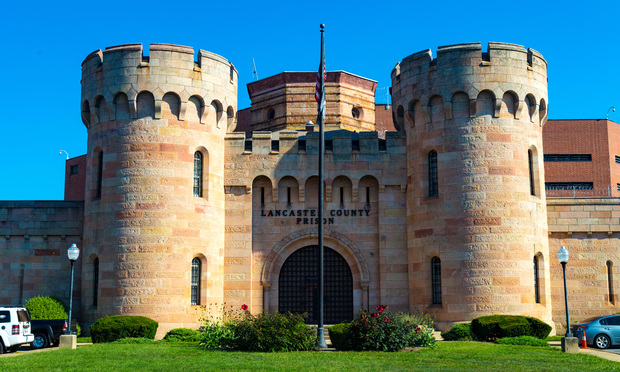'Forced Social Distancing': Courts Urged to Prevent Prisons From Becoming Vector for COVID-19
Philadelphia-area courts and criminal justice lawyers have been working to develop procedures to handle cases as quickly as possible.
March 31, 2020 at 06:59 PM
8 minute read
 The Lancaster County Prison. Photo: George Sheldon/Shutterstock.com
The Lancaster County Prison. Photo: George Sheldon/Shutterstock.com
Prison officials throughout Pennsylvania have been scrambling to contain the outbreak of COVID-19 in correctional facilities, as advocates step up efforts to release the most at-risk inmates.
The series of decisions began more than a week ago as three inmates and five employees at the George W. Hill Correctional Facility in Delaware County tested positive for the coronavirus and had to self-quarantine. On March 27, officials in Philadelphia announced that an inmate and an employee in the city's Department of Prison tested positive as well. Then on Sunday, the Pennsylvania Department of Corrections announced that its first inmate had also tested positive, prompting a system-wide quarantine for state prisons.
In a press release, Department of Corrections Secretary John Wetzel said the decision means all inmate movements will be controlled with social distancing practices and prisoners will have to be fed in their cells.
"This is essentially forced social distancing. We must take this step to contain the virus to one facility and to keep it from spreading throughout the system," Wetzel said. "I don't want to wait until we have several cases in our system to act. We're taking this proactive measure now."
Outside the prisons, the criminal justice system in Pennsylvania is also grappling with how best to stanch what seems to be the inevitable spread of the coronoavirus through local prisons and jails—where spaces are cramped and hygiene is all but nonexistent.
And pressure is mounting.
Recently some Pennsylvania courts have begun taking steps to expedite the process for modifying bail, lifting bench warrants, or allowing for early parole in an effort to decrease the number of inmates lingering in jail. However, there has also been a growing chorus of some in the criminal justice system calling on courts to begin implementing broader measures that would allow for the large-scale release of several categories of nonviolent and vulnerable prisoners before the outbreak hits the prisons in full force.
On Monday, the ACLU of Pennsylvania filed an emergency petition to the state Supreme Court, asking it to use its King's Bench power to order all common pleas courts to begin releasing county inmates who are pretrial or serving short sentences for minor offenses, and any inmate at risk of serious illness or death as a result of COVID-19.
"Absent decisive action, our overcrowded jails will become petri dishes that overwhelm both correctional and health care systems," the ACLU said in its 40-page petition, which, along with attorneys from the ACLU, was filed by lawyers with Arnold & Porter Kaye Scholer; Kairys, Rudovsky, Messing, Feinberg & Lin; and the Pennsylvania Public Defender Association. "The only humanitarian and constitutional solution is to immediately order the release of as many people as possible from our county jails. We urge this court, in the strongest terms, to join the growing chorus of courts who have decided to act in an effort to save lives."
Soon after the lawsuit was announced, Philadelphia District Attorney Larry Krasner issued a press release urging the justices to grant the ACLU's King's Bench petition. In it, he noted that other states have already implemented similar measures, including South Carolina and New Jersey, which last week ordered the release of all low-risk county inmates.
"This historic health emergency demands swift, decisive action by all who have been empowered by the people to act on their behalf," Krasner said. "No one with any amount of public power should get to sit on the sidelines during this crisis."
Although the number of inmates testing positive for COVID-19 has continued to grow in the past weeks, Pennsylvania has already taken some measures to address the problem. One of the most striking examples took place in Allegheny County, where, as of late last week, more than 500 inmates had been released in an effort to combat the spread of the disease. The Pittsburgh Post-Gazette quoted Allegheny County Court of Common Pleas President Judge Kim Berkeley Clark as saying those released were nonviolent offenders at risk of contracting the disease.
In another sign that courts are eager to act to help curtail the outbreak, U.S. District Judge John Jones of the Middle District of Pennsylvania on Tuesday ordered the release of 13 inmates currently being held in custody by the U.S. Immigration and Customs Enforcement at three facilities across the state. Many of the prisoners suffered from health complications, including diabetes and suppressed immune systems, and in his 25-page opinion, Jones said the facilities were "plainly not equipped" to protect them from potentially fatal exposure to COVID-19.
"While this deficiency is neither intentional nor malicious, should we fail to afford relief to petitioners we will be a party to an unconscionable and possibly barbaric result," Jones said. "If we are to remain the civilized society we hold ourselves out to be, it would be heartless and inhumane not to recognize petitioners' plight. And so we will act."
The chorus has received some pushback. U.S. Attorney William McSwain of the Eastern District of Pennsylvania has been critical. Appearing March 27 on the Fox News program "Tucker Carlson Tonight," McSwain said the efforts are a way for progressive prosecutors to push a decarceration agenda at the expense of public safety.
"There are essentially two groups of people that are trying to take advantage of this pandemic for their own selfish purposes—criminals and progressive prosecutors and in many ways I think these two groups are indistinguishable, and I say that because they want the same things," McSwain said. "They essentially want a moratorium on any arrests. They essentially want our jails to be emptied, and both of these groups I think are a clear threat to public safety."
Philadelphia-area courts and criminal justice lawyers have been working to develop procedures to handle cases as quickly as possible.
In Philadelphia, 575 inmates have been released since March 16, according to the Philadelphia Department of Prisons. With 292 admissions during that time period, the local prison population has seen a reduction of 283 inmates in total over the past two weeks. During the same period in 2019, the county jails saw a reduction of only 73 inmates, according to department officials.
Talks to have the process move even faster in Philadelphia are continuing.
A letter issued Monday by Keir Bradford-Grey, the Defender Association of Philadelphia's chief defender, said the process of having attorneys file individual motions and then judges reviewing them on a case-by-case basis was inadequate "in light of the looming crisis." In the letter, Bradford-Grey asked prosecutors and the First Judicial District to identify and immediately release seven categories of inmates, including those held on bail for technical violations, those with less than six months on their sentences, and those being held on minor offenses who could not afford bail.
FJD spokesman Gabriel Roberts, however, said that, despite consist requests, the DA's and Defenders' offices have yet to present the court with a comprehensive list of candidates who should be released. In the meantime, he said, the court has been working to establish remote access for preliminary hearings and non-trial dispositions.
"From the start, court leadership has been working expeditiously to address concerns raised by COVID-19, while also remaining conscientious of their responsibility to ensure public safety as well as access and due process," Roberts said. "Our leadership remains available to continue working with the DA and defender with regard to how their offices can efficiently, and safely, assist our efforts to maintain, and expand, current operations within the mandates of the Pennsylvania Supreme Court—which has closed courts statewide, subject to specific exceptions."
In Montgomery County, things are operating similarly, with release requests largely being handled on a case-by-case basis.
Montgomery County-based criminal defense attorney Steven Fairlie of Fairlie & Lippy said the courts have been delving into issues about possible release of some defendants facing technical certain parole violations, or are nearing the end of their jail sentence. In one instance, he said, the courts agreed that inmates who had been on work release, but had their jobs canceled due to closures related to the coronavirus pandemic, should be given house arrest.
According to Fairlie, Montgomery County's jail population has been decreasing as well, so the efforts appear to be paying off.
"It's not impractical to look at them on a case-by-case basis," Fairlie said. "From the defense perspective, you'd always like to get as many people out as possible, but recognizing the reality of the situation and the concerns of safety, it certainly doesn't hurt to look at each case before making that decision."
This content has been archived. It is available through our partners, LexisNexis® and Bloomberg Law.
To view this content, please continue to their sites.
Not a Lexis Subscriber?
Subscribe Now
Not a Bloomberg Law Subscriber?
Subscribe Now
NOT FOR REPRINT
© 2025 ALM Global, LLC, All Rights Reserved. Request academic re-use from www.copyright.com. All other uses, submit a request to [email protected]. For more information visit Asset & Logo Licensing.
You Might Like
View All

Law Firms Are 'Struggling' With Partner Pay Segmentation, as Top Rainmakers Bring In More Revenue
5 minute read

Trump RTO Mandates Won’t Disrupt Big Law Policies—But Client Expectations Might
6 minute readLaw Firms Mentioned
Trending Stories
Who Got The Work
J. Brugh Lower of Gibbons has entered an appearance for industrial equipment supplier Devco Corporation in a pending trademark infringement lawsuit. The suit, accusing the defendant of selling knock-off Graco products, was filed Dec. 18 in New Jersey District Court by Rivkin Radler on behalf of Graco Inc. and Graco Minnesota. The case, assigned to U.S. District Judge Zahid N. Quraishi, is 3:24-cv-11294, Graco Inc. et al v. Devco Corporation.
Who Got The Work
Rebecca Maller-Stein and Kent A. Yalowitz of Arnold & Porter Kaye Scholer have entered their appearances for Hanaco Venture Capital and its executives, Lior Prosor and David Frankel, in a pending securities lawsuit. The action, filed on Dec. 24 in New York Southern District Court by Zell, Aron & Co. on behalf of Goldeneye Advisors, accuses the defendants of negligently and fraudulently managing the plaintiff's $1 million investment. The case, assigned to U.S. District Judge Vernon S. Broderick, is 1:24-cv-09918, Goldeneye Advisors, LLC v. Hanaco Venture Capital, Ltd. et al.
Who Got The Work
Attorneys from A&O Shearman has stepped in as defense counsel for Toronto-Dominion Bank and other defendants in a pending securities class action. The suit, filed Dec. 11 in New York Southern District Court by Bleichmar Fonti & Auld, accuses the defendants of concealing the bank's 'pervasive' deficiencies in regards to its compliance with the Bank Secrecy Act and the quality of its anti-money laundering controls. The case, assigned to U.S. District Judge Arun Subramanian, is 1:24-cv-09445, Gonzalez v. The Toronto-Dominion Bank et al.
Who Got The Work
Crown Castle International, a Pennsylvania company providing shared communications infrastructure, has turned to Luke D. Wolf of Gordon Rees Scully Mansukhani to fend off a pending breach-of-contract lawsuit. The court action, filed Nov. 25 in Michigan Eastern District Court by Hooper Hathaway PC on behalf of The Town Residences LLC, accuses Crown Castle of failing to transfer approximately $30,000 in utility payments from T-Mobile in breach of a roof-top lease and assignment agreement. The case, assigned to U.S. District Judge Susan K. Declercq, is 2:24-cv-13131, The Town Residences LLC v. T-Mobile US, Inc. et al.
Who Got The Work
Wilfred P. Coronato and Daniel M. Schwartz of McCarter & English have stepped in as defense counsel to Electrolux Home Products Inc. in a pending product liability lawsuit. The court action, filed Nov. 26 in New York Eastern District Court by Poulos Lopiccolo PC and Nagel Rice LLP on behalf of David Stern, alleges that the defendant's refrigerators’ drawers and shelving repeatedly break and fall apart within months after purchase. The case, assigned to U.S. District Judge Joan M. Azrack, is 2:24-cv-08204, Stern v. Electrolux Home Products, Inc.
Featured Firms
Law Offices of Gary Martin Hays & Associates, P.C.
(470) 294-1674
Law Offices of Mark E. Salomone
(857) 444-6468
Smith & Hassler
(713) 739-1250





